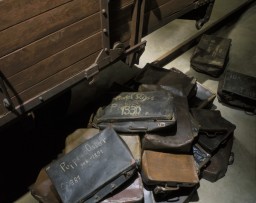You searched for: 纽约网上赌场,美国网上赌场,美国赌球网站,【www.2kk4.com,复制打开网址】,网上赌博游戏,美国赌场地址,美国在线赌博平台,美国赌球app,纽约云顶赌场,美国拉斯维加斯赌场,美国博彩游戏,美国博彩公司,美国博彩网站,,2kk4.com网址KAcExxffExhfBBgfh
<< Previous | Displaying results 26-50 of 329 for "纽约网上赌场,美国网上赌场,美国赌球网站,【www.2kk4.com,复制打开网址】,网上赌博游戏,美国赌场地址,美国在线赌博平台,美国赌球app,纽约云顶赌场,美国拉斯维加斯赌场,美国博彩游戏,美国博彩公司,美国博彩网站,,2kk4.com网址KAcExxffExhfBBgfh" | Next >>
-
Dr. Robert Ritter and Eva Justin examine a young boy interned in a "Gypsy camp"
PhotoDr. Robert Ritter and Eva Justin examine a young boy interned in a Zigeunerlager (“Gypsy camp”). Cologne, Germany, c. 1937-1940. During the Nazi era, Dr. Robert Ritter was a leading authority on the racial classification of people pejoratively labeled “Zigeuner” (“Gypsies”). Ritter’s research was in a field called eugenics, or what the Nazis called “racial hygiene.” Ritter worked with a small team of racial hygienists. Among them were Eva Justin and Sophie Ehrhardt. Most of the people…
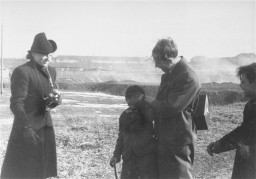
-
Reichstag Fire Decree
ArticleThe Reichstag Fire Decree of February 1933 restricted individual freedoms, and allowed Hitler's government to overrule state and local laws and overthrow state and local governments.
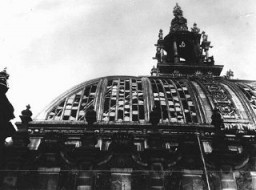
-
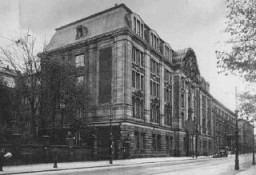
-
Nuremberg Race Laws
ArticleLearn more about the Reich Citizenship Law and the Law for the Protection of German Blood and German Honor, collectively known as the Nuremberg Race Laws.
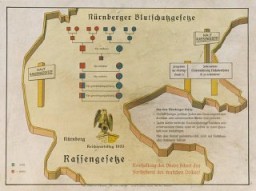
-
Supreme Court Decision on the Nuremberg Race Laws
ArticleLearn more about the 1936 German Supreme Court decision on the Nuremberg Race Laws.
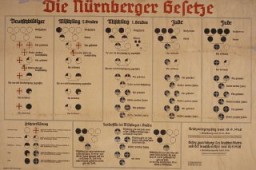
-
1945 photograph of Regina (Laks) Gelb
PhotoPhotograph of Regina (Renia) taken on June 2, 1945, in Lodz, Poland.

-
The Nazi Olympics Berlin 1936: African American Voices and "Jim Crow" America - Photos and Videos
Media Essay18 African Americans (16 men and 2 women) competed in the 1936 Olympic Games in Berlin. This was three times the number who had competed in the 1932 Los Angeles Games. The African American athletes on the 1936 US Olympic team brought home 14...
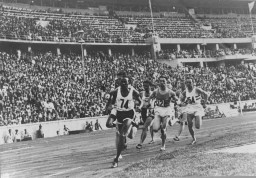
-
Hoess affidavit
ArtifactAffidavit signed by Rudolf Hoess attesting to the gassing of Jews while he was the commandant of the Auschwitz killing center. The German text reads: "I declare herewith under oath that in the years 1941 to 1943 during my tenure in office as commandant of Auschwitz Concentration Camp 2 million Jews were put to death by gassing and a 1/2 million by other means. Rudolf Hoess. May 14, 1946." The confession is also signed by Josef Maier of the US Chief of Counsel's office. A photoreproduction of the original…
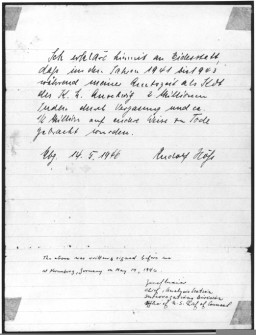
-
International Military Tribunal: The Defendants
ArticleListing of the 24 leading Nazi officials indicted at the International Military Tribunal at Nuremberg. Learn about the defendants and the charges against them.
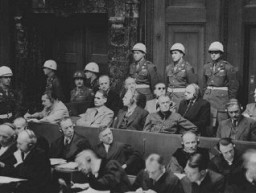
-
Nazi propaganda election poster
ArtifactElection poster reading "We workers have awakened: We’re voting National Socialist List 2 ," 1932.
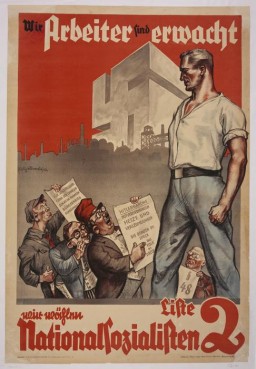
-
Hungarian Labor Service conscripts
PhotoConscripts of Hungarian Labor Service Company VIII/2 at work laying railroad track. Huszt, Hungary, 1942.
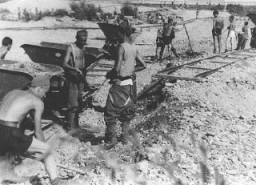
-
Hidden child in the Netherlands
PhotoJewish child Hans van den Broeke (born Hans Culp) in hiding in the Netherlands. He is 2 years old in this photograph.
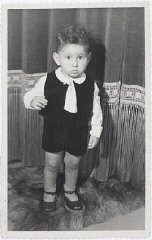
-
A building designated for Jews
PhotoEntrance to the courtyard, marked with a Star of David, of a building designated for Jews. Budapest, Hungary, after April 2, 1944.
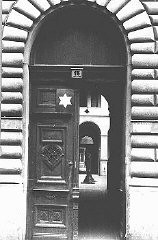
-
Mass marriage of 50 couples in Berlin
PhotoA mass marriage of 50 couples in Berlin. All of the couples belonged to the Nazi Party. Berlin, Germany, July 2, 1933.
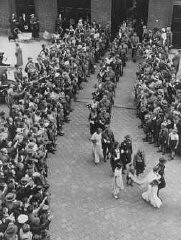
-
Vilna
ArticleDuring the Holocaust, the creation of ghettos was a key step in the Nazi process of ultimately destroying Europe's Jews. Learn about the Vilna ghetto.
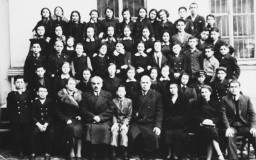
-
Killing Center Revolts
ArticleUnder the most adverse conditions, prisoners initiated revolts in killing centers. Learn more about prisoner uprisings in Treblinka, Sobibor, and Auschwitz.
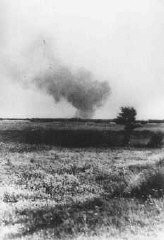
-
Prisoners of the Camps
ArticleJews were the main targets of Nazi genocide. Learn about other individuals from a broad range of backgrounds who were imprisoned in the Nazi camp system.
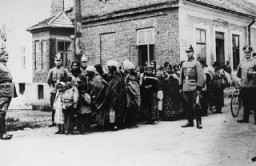
-
Theresienstadt: Key Dates
ArticleExplore key dates in the history of the Theresienstadt camp/ghetto, which served multiple purposes during its existence from 1941-45.
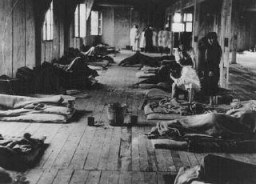
-
Hajj Amin al-Husayni: Key Dates
ArticleKey dates associated with Hajj Amin al-Husayni, former Mufti of Jerusalem who participated in a pro-Axis coup in Iraq in 1941. Explore further
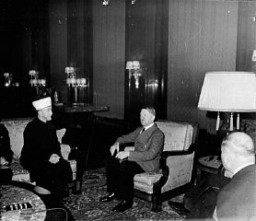
-
Warsaw Uprising
ArticleThe 1944 Warsaw uprising was the single largest military effort undertaken by resistance forces to oppose German occupation during World War II.
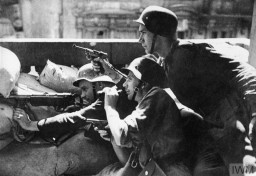
-
How Many People did the Nazis Murder?
ArticleBehind the number of victims of the Holocaust and Nazi persecution are people whose hopes and dreams were destroyed. Learn about the toll of Nazi policies.
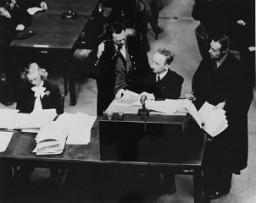
-
1943: Key Dates
ArticleExplore a timeline of key events during 1943 in the history of Nazi Germany, World War II, and the Holocaust.
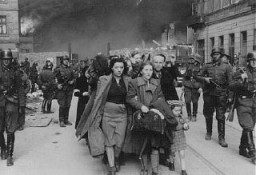
-
100-meter race at the Olympic Games in Berlin, 1936
Film[This video is silent] Olympic athlete Jesse Owens won four medals at the 1936 Olympic Games in Berlin, Germany: 100-meter dash, gold200-meter dash, goldBroad (long) jump, gold4x100-meter relay, gold This footage shows Owens winning the 100-meter dash in a time of 10.3 seconds. Owens was one of the 18 African Americans (16 men and 2 women) who competed in the 1936 Olympic Games in Berlin. These athletes brought home 14 medals: 8 gold; 4 silver; and 2 bronze.
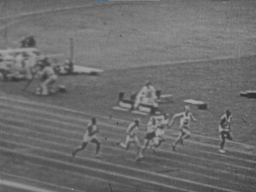
-
Railcar: Interior
ArtifactMany different kinds of railway cars were used for deportations. They varied in size and weight. The railway car on display in the United States Holocaust Memorial Museum's Permanent Exhibition is of just one type used. The dimensions of the railway car in the Museum's exhibition are as follows: Total length 31 feet 6 inches (9.6 meters); interior space for deportees 26 feet 2 inches (8 meters). Total height 14 feet (4.3 meters) from the bottom of the wheel to the highest point of the car; interior space…
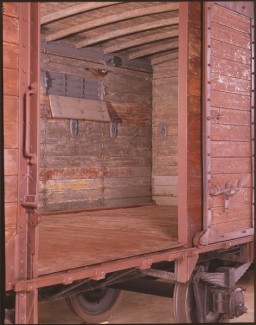
-
Valises by the railcar in the Museum's Permanent Exhibition
ArtifactMany different kinds of railway cars were used for deportations. They varied in size and weight. The railway car on display in the United States Holocaust Memorial Museum's Permanent Exhibition is of just one type used. The dimensions of the railway car in the Museum's exhibition are as follows: Total length 31 feet 6 inches (9.6 meters); interior space for deportees 26 feet 2 inches (8 meters). Total height 14 feet (4.3 meters) from the bottom of the wheel to the highest point of the car; interior space…
